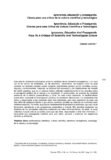Mostrar el registro sencillo del ítem
Ignorancia, educación y propaganda. Claves para una crítica de la cultura científica y tecnológica
| dc.creator | Larrión Cartujo, Jósean | es_ES |
| dc.date.accessioned | 2017-02-07T14:52:28Z | |
| dc.date.available | 2017-02-07T14:52:28Z | |
| dc.date.issued | 2017 | |
| dc.identifier.issn | 1850-0013 | |
| dc.identifier.uri | https://hdl.handle.net/2454/23500 | |
| dc.description.abstract | Este artículo analiza la controversia sobre la viabilidad de los alimentos transgénicos, y lo hace con el fin central de entenderla, no de resolverla. Inicialmente, se muestra cómo en este contexto los factores sociales suelen juzgarse perjudiciales porque se los considera sucios, impuros y contaminantes. Después, se exponen los supuestos y las implicaciones del modelo del déficit cognitivo, que es un enfoque teórico utilizado tradicionalmente en los estudios sobre la percepción pública de la ciencia y la tecnología. A continuación, se constata la creciente presencia de la ciencia posacadémica y cómo, en este nuevo escenario, el neoliberalismo puede estar coartando la investigación pública y el pluralismo democrático. La ciudadanía más activa y responsable suele pretender estar bien informada, pero esta aspiración es cada vez más difícil de realizarse debido a que ciertos conflictos sociales se traducen en conflictos entre sistemas expertos. Por ende, se propone complementar la perspectiva positivista, que aquí es la dominante, atendiendo a las perspectivas materialista y cultural. Ello permitirá esclarecer los objetivos de los principales colectivos implicados en tales enfrentamientos. Es decir, si estos colectivos buscan educar al público para que sea libre, responsable y esté bien informado, o persuadirle con propaganda cognitiva para que tolere, apruebe y consuma los respectivos servicios y artefactos. | es_ES |
| dc.description.abstract | This paper examines the controversy over the viability of transgenic foods, in an attempt to understand and not to resolve this issue. Initially, it describes how, in this context, social factors tend to be perceived in a negative manner, since they are often considered to be dirty, unclean and contaminating. Next, the assumptions and implications of the cognitive deficit model are presented, as this theoretical approach has been traditionally used in studies on public perception of science and technology. Afterwards, the growing presence of post-academic science is discussed, as well as how, in this new scenario, neo-liberalism may obstruct public research and democratic pluralism. Active and responsible citizens can try to be well informed, but this is an increasingly difficult task, given that certain social conflicts have become parallel conflicts between expert systems. Finally, it is suggested that the positivist perspective, which is the dominant perspective here, can be complemented by materialist and cultural perspectives. This allows us to clarify the objectives of the main groups involved in these controversies. In other words, it determines whether or not these groups attempt to educate the public in order to ensure that they are free, responsible and well informed, or if they actually wish to persuade them with cognitive propaganda so that they shall tolerate, approve and consume the respective services and artifacts. | en |
| dc.format.extent | 22 p. | |
| dc.format.mimetype | application/pdf | en |
| dc.language.iso | spa | en |
| dc.publisher | OEI, REDES, Instituto ECYT | es_ES |
| dc.relation.ispartof | CTS. Revista Iberoamericana de Ciencia, Tecnología y Sociedad, nº. 34, vol. 12, pp. 111-132 | es_ES |
| dc.subject | Biotecnología | es_ES |
| dc.subject | Comunicación | es_ES |
| dc.subject | Conocimiento experto | es_ES |
| dc.subject | Información | es_ES |
| dc.subject | Riesgo | es_ES |
| dc.subject | Ciencia | es_ES |
| dc.subject | Incertidumbre | es_ES |
| dc.subject | Biotechnology | en |
| dc.subject | Communication | en |
| dc.subject | Expertise | en |
| dc.subject | Information | en |
| dc.subject | Risk | en |
| dc.subject | Science | en |
| dc.subject | Uncertainty | en |
| dc.title | Ignorancia, educación y propaganda. Claves para una crítica de la cultura científica y tecnológica | es_ES |
| dc.title.alternative | Ignorance, education and propaganda. Keys to a critique of scientific and technological culture | en |
| dc.type | Artículo / Artikulua | es |
| dc.type | info:eu-repo/semantics/article | en |
| dc.contributor.department | Sociología | es_ES |
| dc.contributor.department | Soziologia | eu |
| dc.rights.accessRights | Acceso abierto / Sarbide irekia | es |
| dc.rights.accessRights | info:eu-repo/semantics/openAccess | en |
| dc.type.version | Versión publicada / Argitaratu den bertsioa | es |
| dc.type.version | info:eu-repo/semantics/publishedVersion | en |


